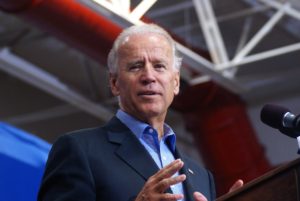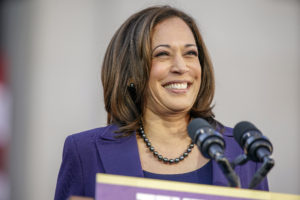The Latinx Vote Might Carry ‘Tío Bernie’ to Victory
Sanders is winning over the nation’s largest minority voting bloc — and that could make the difference in Nevada and beyond. Alexandria Ocasio-Cortez's coveted endorsement has broadened Bernie Sanders' appeal among Latinx voters. (Kelvin Kuo / AP)
Alexandria Ocasio-Cortez's coveted endorsement has broadened Bernie Sanders' appeal among Latinx voters. (Kelvin Kuo / AP)
There’s no denying Latinx voters are falling in love with “Tío Bernie.” As a supporter of Bernie Sanders myself, I’d been reading indications of this phenomenon for many months “con mi corazón en la boca,” a Spanish saying that translates roughly to “with baited breath.” Sanders has led the Democratic field among Latinxs in poll after poll, with a recent survey showing 48% favor the Vermont senator nationwide. In Nevada, that number climbs to 64%.
National @MorningConsult Poll Among
Black Voters:
Biden 34% (-1 From Pre NH Primary Poll)
Sanders 30% (+3)
Bloomberg 19% (+3*)
Warren 8% (-)
Buttigieg 4% (-)Hispanic Voters:
Sanders 48% (+10)
Bloomberg 17% (+1)
Biden 13% (-4)
Buttigieg 8% (+2)
Warren 7% (+4)— Political Polls (@PpollingNumbers) February 13, 2020
According to the company Plus Three, the progressive stalwart also received $8.3 million in donations from Latinxs in 2019, amounting to 36% of all contributions from the minority group — a number that puts him ahead of all other Democratic contenders in 49 states and every major city.
I witnessed this fervent support firsthand during a December rally in Venice Beach, California, where an estimated 20,000 attendees, musical guests and speakers switched seamlessly between Spanish and English, sometimes in the same breath. Many of the organizers, including youth leader Jocelyn García, who brought her parents onto the stage, spoke about the struggles immigrants, first-generation Latinxs and the greater community are facing in a country whose president has vilified them at every turn.
Latinxs weren’t the only ones “feeling the Bern” that day on Venice Beach (I recall a young mother, with a headscarf depicting the U.S., walking with her children and a family speaking Swedish nearby), but they were certainly the largest group present. Two Latinx women confided to me that they hadn’t voted in the 2016 general election, let alone the primaries. “We just didn’t think it mattered,” said Jamie Gonzalez, a first-generation Sanders supporter.
This kind of political disillusionment is not uncommon. As Shawn Navarro, a 33-year-old Sanders volunteer in Las Vegas, told NPR recently:
[Latinos] are tired of listening to talking points from Democrats who come to their neighborhoods, ‘speak a little bit of Spanish’ and ‘eat tacos,’ but then don’t deliver any real results. It’s why, he says, exit polls found that Donald Trump and Mitt Romney, ‘who was far less offensive,’ performed roughly equally with Latinos in the 2016 and 2012 elections.
There is a huge distrust among the Latinx community with the Democratic Party that they’re not following through on their promises. Bernie is the exact opposite. He has a real authenticity.
It’s not just authenticity or “barrio cred” that Sanders has going for him, but policy, too. When I asked Gonzalez what drew her and her friend Carol to a Sanders rally, she rattled off several of his major proposals: Medicare-for-all, a $15 minimum wage and the elimination of student debt. Judging by the cheers each of these proposals drew at the rally, Gonzalez and Carol were hardly alone in their enthusiasm for Sanders’ platform.
Sanders’ success with this voting bloc is less surprising than it might appear to our mainstream media. After largely failing to reach many people of color in the 2015 primaries, he has rectified his mistake, presenting himself to the Latinx community as a grandchild of immigrants. Sanders has also hired more than 100 Latinx staffers nationwide, including Belén Sisa as his deputy press secretary. A native of Argentina, she caught the public’s attention after posting online a photo of herself with her tax forms to remind Americans that undocumented immigrants do, in fact, pay taxes. Sisa is one of the many “Dreamers” protected under the Deferred Action for Childhood Arrivals (DACA) program, and her hire has affirmed Sanders’ commitment to the program.
The Democratic candidate’s promise to safeguard immigrant communities does not end there. Sanders has called for a slew of sweeping changes, including a moratorium on all deportations and an end to the construction of a border wall. He also pledges to use his executive authority to remove the threat of deportation for all undocumented immigrants who have lived in the United States for at least five years. Perhaps more significantly, he has called for the dissolution of Immigration and Customs Enforcement.
This plan doesn’t just distinguish him from his fellow Democratic candidates but from President Obama, who infamously earned the nickname “deporter in chief” after expelling more immigrants than his two predecessors combined. The Obama administration’s approach to immigration also partly explains young Latinxs’ lack of interest in former Vice President Joe Biden’s presidential campaign. According to Voto Latino’s Danny Turkel, the biggest obstacle for candidates like Biden has been “a significant lack of investment in the Latinx electorate on the part of the political establishment.”
“In 2018, 48% of Latinx voters reported not being contacted by a single political party or campaign,” Turkel told Truthdig. “That indicates the apathy that Washington has toward courting and engaging our voters.”
While Turkel notes that Democratic candidates have largely failed to connect with Latinx voters, Domingo Garcia, president of the League of United Latin American Citizens (LULAC), told Time that “Sanders has the strongest Latino outreach of any campaign.” On a national scale, that’s manifested largely in the form of Spanish mailers, but also community events, some cleverly called names like “Tamales for Tío,” where Latinxs of all ages and backgrounds have come together to discuss the campaign’s core ideas. Another method has been having callers from states like Florida reach out to their Midwestern counterparts in both Spanish and English as part of a grassroots movement across the country.
Perhaps one of the most important things the democratic socialist has done this election cycle is simply show up and listen. As Turkel pointed out, this simple form of engagement has become rare for a generation of politicians divorced from the people they are meant to be representing. Just look at what Sanders achieved in Iowa, a state where only 3.4% of eligible voters are Latinxs. Per Politico:
Sanders is one of the few 2020 contenders who has spent substantial time with Latinos in Iowa, according to Latino operatives and leaders in the state. He has gone to Lotería game nights put on by LULAC and was the only top-tier candidate who appeared at the group’s forum. He’s also held “Unidos Con Bernie” aimed at the Latino community.
And according to The Hill, his approach clearly paid off:
Sen. Bernie Sanders (I-Vt.) won big among Latino voters in this week’s Iowa caucuses, according to previously unreleased data from the UCLA Latino Policy & Politics Initiative.
In the state’s four Spanish-language caucus sites, Sanders, obtaining 428 votes against a combined 14 divided between former Vice President Joe Biden, former South Bend, Ind., Mayor Pete Buttigieg, Sen. Elizabeth Warren (D-Mass.) and entrepreneur Andrew Yang.
This is the first presidential election in which Iowa Democrats have made Spanish-language satellite caucus sites available.
‘All of them [voted for Sanders]. It’s amazing what you do when you go to the community to listen to them and then hire them,’ said Sanders senior adviser Chuck Rocha, the architect of the campaign’s Latino strategy.
Sanders has earned the support of Cardi B, sitting down to discuss politics with the Dominican American rapper at a nail salon in August (he has since encouraged her to run for office). The co-chair of his campaign is San Juan Mayor Carmen Yulín Cruz, who was thrust into the national spotlight after the Trump administration all but refused to assist Puerto Rico in the wake of Hurricane Maria. And one of his most prominent surrogates is perhaps the most recognizable Latinx politician in the country. I’m speaking, of course, about Rep. Alexandria Ocasio-Cortez, D-N.Y., who has credited Sanders with inspiring her to run for office.
At the Venice Beach rally, I watched Ocasio-Cortez speak about progressive policies with a passion and eloquence matched only by Sanders himself. Their friendship has been evident from the start — watch the clip below of AOC surprising Sanders in Iowa — but the two have also co-sponsored key legislation, such as the Green New Deal:
.@AOC instagram stories with bernie are just ?✨ pic.twitter.com/qSeilBoi4A
— kurtis wu (@kurtis_wu) November 9, 2019
When Ocasio-Cortez was asked recently why she endorse Sanders, she told CNN, “He’s the only candidate that very solidly rests all of his policies on a principle of universality. So, he doesn’t believe in means testing. He doesn’t believe in asterisks. It’s not about tuition-free college if you’re good enough — it’s about tuition-free college in America. And so those principles of universality I think dovetail quite excellently with humane immigration policy.”
Seeing the two on stage together in California, one thing was obvious: While countless working-class leaders have preceded him, Sanders’ election this year would transform the country. He understands the need to build a movement that will outlive him, hence his slogan, “Not me. Us,” and he is already preparing to pass the baton by championing young progressives like Ocasio-Cortez, and Reps.Ilhan Omar and Rashida Tlaib. United, this movement could provide a left-wing counter to the Reagan revolution of the 1980s.
Nationwide strategies aside, the Sanders campaign also understands that California, which boasts the largest Latinx population in the country and 30.5% of eligible voters, will play a key role in deciding the Democratic primaries, especially now that the delegate-rich state has moved its election to Super Tuesday.
“We have built the largest grassroots campaign in the state, thanks to the working class people of California who have given their time and energy, and who have embraced the moral imperative of defeating Donald Trump and transforming our country for the better,” Sanders’ California state director, Rafael Návar, told Truthdig. “In a moment of extreme inequality, increasing homelessness, and an uncertain future for young people, Californians understand that only Sen. Sanders has the vision to make housing affordable, create tuition-free public colleges, and fight for the good-paying, union jobs that all Americans deserve.
“We are also grateful for the support of the Latino community, which is the strength of our grassroots movement in the Golden State, and we do not underestimate their power in this election. California is an essential part of Sen. Sanders’ movement, and we intend to win.”
There seems to be only one caveat to Tio Bernie’s success among Latinxs, one I could see clearly from where I was standing that warm December day in L.A. It seemed a majority of the Latinxs at the Sanders rally were under age 50. There were older Latinxs present, just not in such large numbers. This is part of a larger trend media outlets like The New York Times have picked up on: While an undeniable majority of young Latinxs are rooting for Sanders this primary season, their parents and grandparents are a different story, one that’s more complex than first meets the eye.
The median age of Latinxs in the U.S. is 28, so Sanders’ support among young voters is statistically the most important. Many of our parents and grandparents, however, have different voting tendencies, some having to do with Catholic upbringings. This has historically led to many Latinxs voting conservative; others have to do with immigration status and voter eligibility. There are also some older Latinx voters who have had significant exposure to dethroned Democratic front-runner Joe Biden, due to his eight years as vice president. This might be motivating some Latinxs to vote for a man with whom they’re familiar. Biden is neck-and-neck with Sanders for Latinx support in states like Nevada, for example.
In my own Mexican American family, many of these national trends were also present. As I reached out to my cousins in Illinois, the state I grew up in, where 11.6% of eligible voters are Latinx, I received a wide range of responses. From apathetic nonvoters to Trump supporters, my cousins, all born to parents who were undocumented much of their lives, seem to run the political gamut. One cousin, Rocío Zapata, a clinical therapist and school counselor in the Chicago public school system, told me she and many of her Latinx friends were voting for Sanders.
“I can’t speak for my friends,” she said when I asked what drew her to Sanders, “but I align with his views on free college education, canceling student debt, boosting the pay of educators, universal health care, DACA support, taxing the wealthy, stricter gun laws and his pro-green plans in regard to our climate crises.
“These are important concerns for myself which also impact our communities,” she concluded.
Her father, like many of our aunts and uncles, is not eligible to vote in the upcoming elections due to his legal status. In my nuclear family, my mother, who has been suspicious of American governmental institutions since her years as an undocumented immigrant hiding her status from “la migra” — immigration officials — has registered to vote for the first time since she became a U.S. citizen decades ago. What’s different this time? I asked. This time, she has someone to believe in, and that someone is Sanders.
As a woman of color living with several disabilities and surviving thanks to the Medicare and Medicaid programs, she has been heartened to hear a politician champion universal health care. Two of her children, myself and her youngest son, have spent many years living in countries such as Spain, Portugal and the United Kingdom, where health care is a right, and she has witnessed firsthand how these health systems help not just legal residents such as me, but even visitors like her when she required medical attention during a trip to see us. She wants this sort of access for Americans, too, she tells me.
Perhaps the most surprising person in my family to support Sanders has been my middle brother, an MIT graduate and a mechanical engineer at a large tech company. While my youngest brother, Nicholas, who is studying to be a social worker, and I have shown an interest in socialist policies throughout our young adulthood, Alexis has spent his early adult years in a much more affluent, less diverse context, and has seemed less keen to delve into politics. And yet, when I asked him who he was voting for on March 3, he joked, “He rhymes with Sernie Banders.”
His reasons echoed many of the same policies Rocío mentioned, which might be unsurprising given that many first-generation, college-educated brown Americans, like some of my cousins, brothers and I, have been shown to have been disproportionately affected by the 2008 financial crisis and are financially worse off than our peers who did not attend college.
This serves as evidence to some of us that the so-called American dream our parents left entire lives behind to chase, was at best, a myth. Matt Baretto, co-founder of the national polling and research firm Latino Decisions, notes how Sanders’ rhetoric actually reflects what many parents wanted for their children when immigrating to the U.S.
“The way he talks about education and college matches the sort of ‘American dream’ experience that a lot of first- and second-generation immigrant families think about,” Barreto said, adding that to many in the community, opening doors to higher education means “opportunity and access to social mobility.”
When I asked Voto Latino why Latinx voters are so important to the 2020 election, Turkel had a simple answer.
“This will be the first election in which the Latinx community will be the second-largest voting bloc in the country,” he said. “Thirty-two million Latinx people will be eligible to vote this cycle. One million Latinx people have turned 18 every year since 2016.
“That’s four million potential new voters who heard Donald Trump refer to their loved ones as rapists, criminals and drug dealers,” Turkel continued. “This election is the first time they’ll be able to take action and make their voices heard. So, 2020 is the first time we’ll see the Latinx community really step into its growing political power.”
There are already indications of this “growing political power.” In the 2018 midterm elections, a Univision analysis found that Latinx turnout doubled in several states, including Nevada, California, Florida, New York and Texas. And according to some measures, Latinx voters may become the largest minority voting bloc in the 2020 election, surpassing African Americans. The question is whether a Democratic candidate will be able to harness this power to win, not just the primary, but the general election. So far, it seems that Sanders is the candidate most willing to try, with some calling his appeal to Latinx voters his “secret weapon” or “big bet.”
At Saturday’s Nevada caucuses, we’ll see for the first time if what worked for Sanders in Iowa will work in a state with a much higher Latinx population and plenty more delegates up for grabs; and we’ll see it before March 3 reveals what California and other states voting on Super Tuesday have to say about the democratic socialist’s plans for America.
Your support matters…Independent journalism is under threat and overshadowed by heavily funded mainstream media.
You can help level the playing field. Become a member.
Your tax-deductible contribution keeps us digging beneath the headlines to give you thought-provoking, investigative reporting and analysis that unearths what's really happening- without compromise.
Give today to support our courageous, independent journalists.






You need to be a supporter to comment.
There are currently no responses to this article.
Be the first to respond.